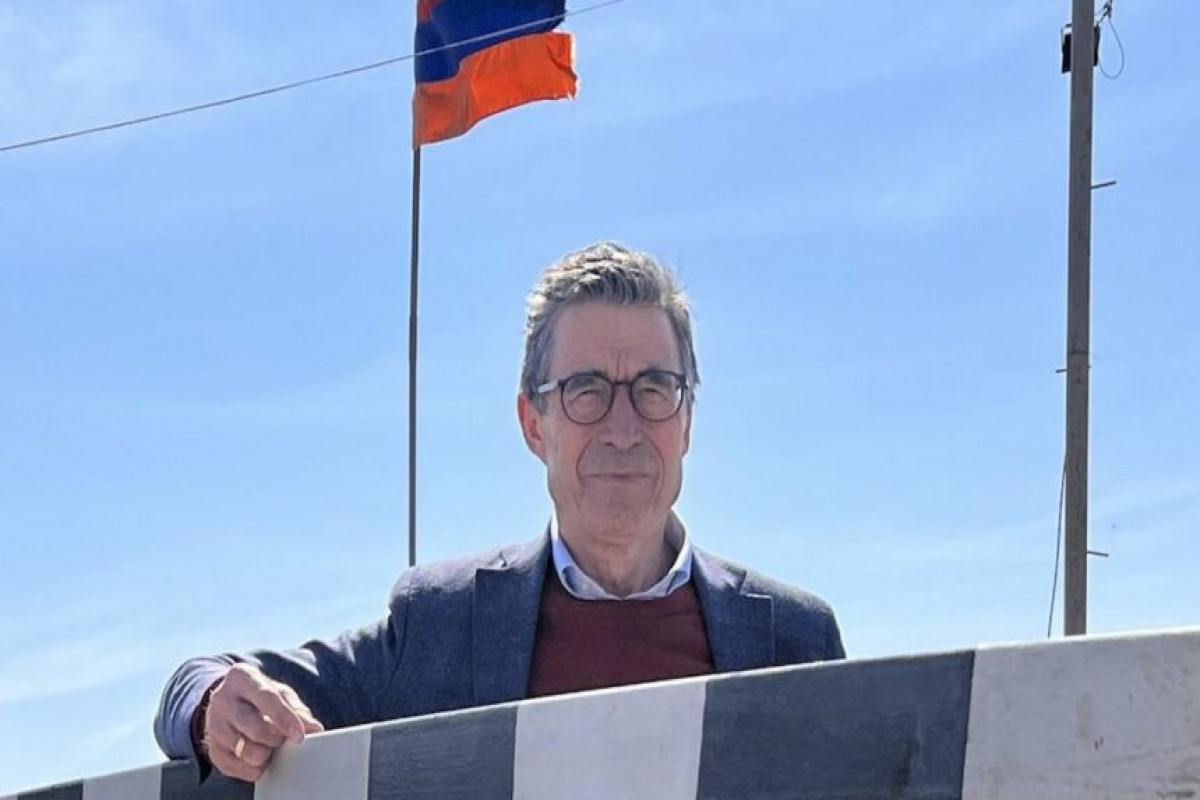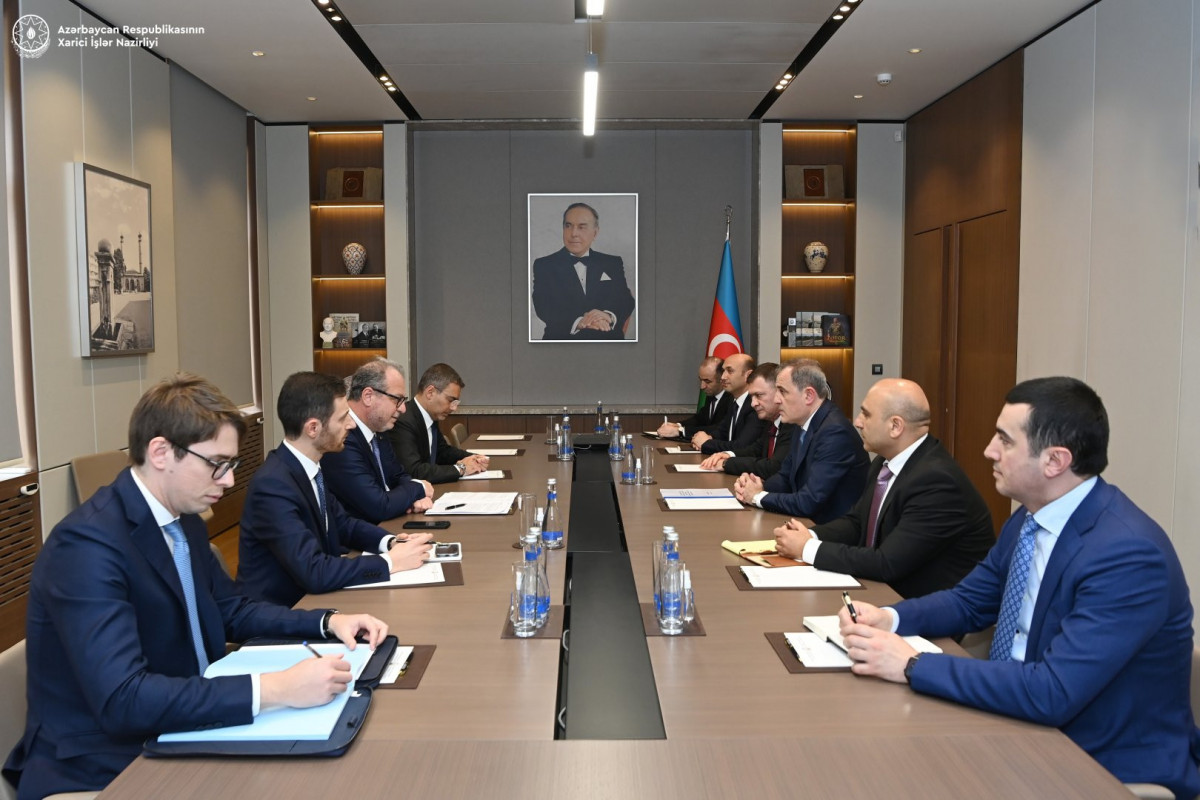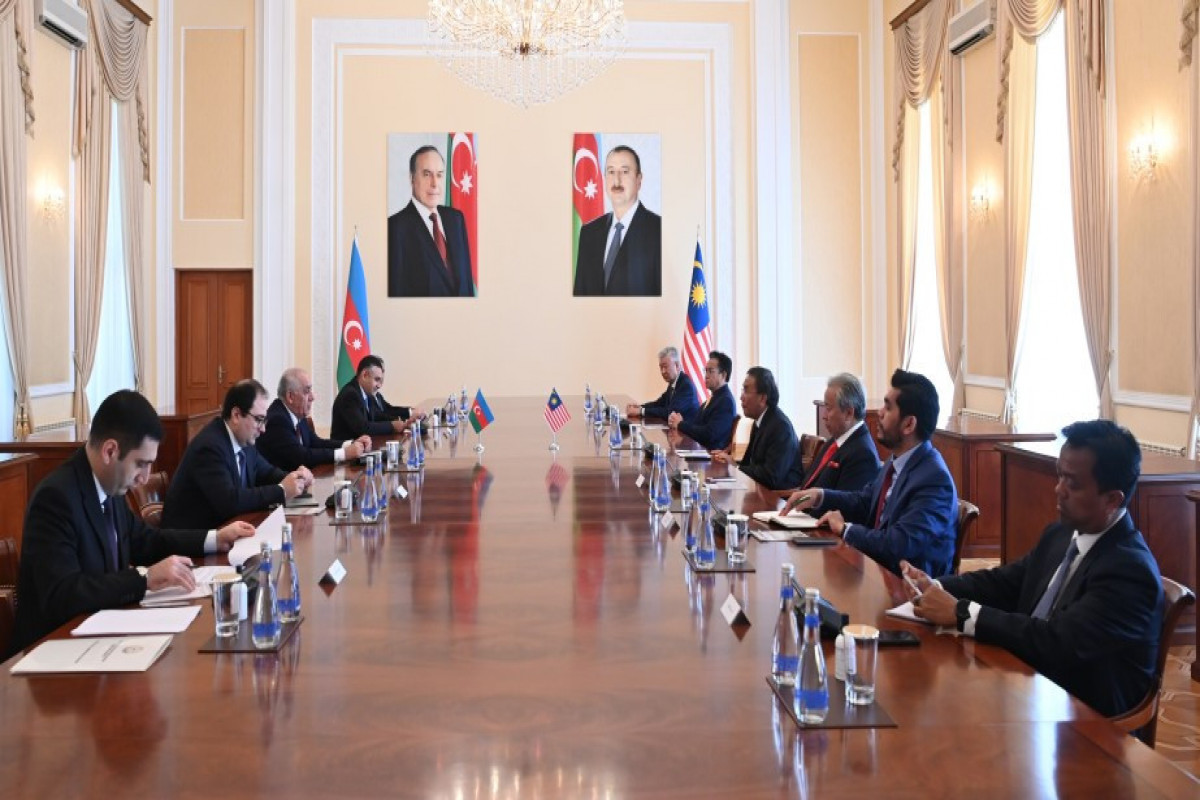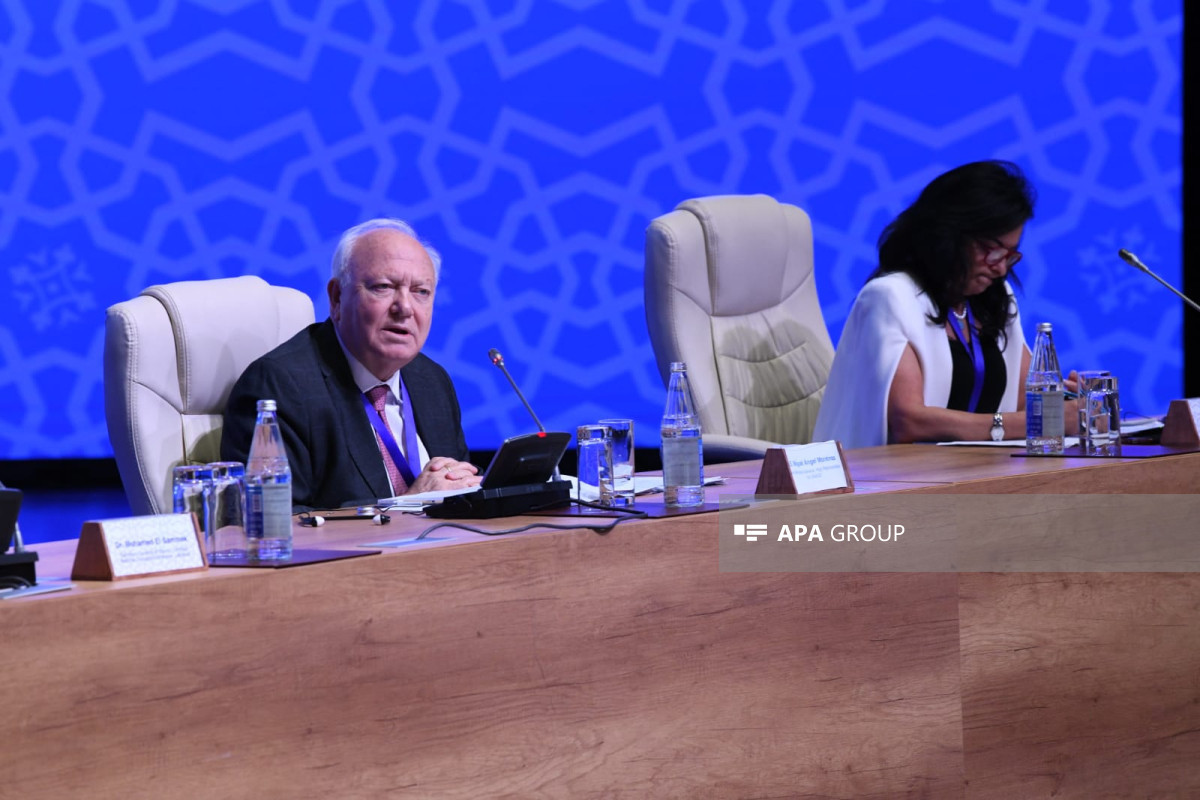Center of Analysis of International Relations (AIR Center) prepared a response to the baseless claims about Azerbaijan in the report called "Deepening EU-Armenia relations; More Europe in Armenia; More Armenia in Europe" prepared by the "Friends of Armenia Network" group headed by Anders Fogh Rasmussen, former Prime Minister of Denmark and former Secretary General of NATO, AIR Center told APA.
The report states that giving recommendations to Armenia to develop its relations with the European Union (EU) is a positive thing and it does not conflict with the interests of Azerbaijan: "Rassmussen Global introduces itself as an international political consultancy firm, headquartered in Brussels and Copenhagen, founded by Anders Fogh Rasmussen, former Secretary-General of NATO, in 2014. Most analysts and political observers in the South Caucasus heard about this firm for the first time when its founder paid a rather controversial visit to Armenia in March 2023 amidst tense political and military situation between this Caucasian country and its neighbor Azerbaijan. Rasmussen Global does not hide that the firm has started working “with” (i.e. for) the Armenian government in March 2023, “to improve [Armenia’s] connections with the European Union and the wider democratic world.” At that time, it became known that Rasmussen’s income statement1 listed Armenia among the clientele of the ex-secretary general, along with the EU missions in Japan and Taiwan, Equinor, Viasat, etc. His work has therefore caused widespread criticism also in the Armenian public who questioned true intentions of the ex-NATO chief in activities concerning Armenia. For example, Alison Tahmizian Meuse, an Armenian journalist, sharing the income statement of Rasmussen on X (Twitter), wrote: “In case you thought Anders Fogh Rasmussen was in Armenia out of altruism, or on behalf of NATO in any capacity... The Armenian government is paying him for this.”2 Nevertheless, Rasmussen’s lobbying work would not have been an issue to be raised in this research memo, had he done his job based on objective situation on the ground and, more importantly, without demonizing Azerbaijan through falsification of facts and distorting the realities. Indeed, many former politicians and diplomats engage in consultancy and lobbyism after leaving their official positions. However, it is reasonable to expect them to maintain loyalty to the national interests of the country or group of countries they once represented, and to conduct themselves in a manner that exemplifies the highest values of society. Unfortunately, Anders Fogh Rasmussen, who was the 24 th prime minister of Denmark from November 2001 to April 2009, and the 12th NATO Secretary-General from August 2009 to October 2014, engages in lobbying activities that serve only his own narrow financial interests and, more concerning, undermine the interests of the alliance he once represented. In a similar vein, the latest report, produced by Rasmussen Global and its initiative “Friends of Armenia Network”, calls for deeper cooperation between Armenia and the EU.3 The report titled “Deepening EU-Armenia relations: More Europe in Armenia; More Armenia in Europe” refers to extremely biased information about Armenia and presenting Azerbaijan as the imaginary threat to Armenia’s national security and territorial integrity.
The objectives of the report are clear. As indicated in its title, the report offers a list of policy recommendations for enhancing Armenia’s relations with the EU. This is a noble objective and, in fact, in line with the interests of Azerbaijan, as well. The EU, as the main trading partner of Azerbaijan, sharing the country’s 65 percent of overall foreign trade, is welcomed in Baku. The EU is also a major partner as well as investor in the Middle Corridor, a transportation route between Europe and China that passes through the South Caucasus. Strengthening the EU’s presence in the region would therefore foster deeper bonds and contribute positively to the regional peace and prosperity, including that of Azerbaijan. However, Azerbaijan is concerned regarding certain political and expert groups within Armenia and the EU, who conduct these campaigns aimed at intensifying EUArmenia relations through the distortion of facts, demonization of Azerbaijan, and misrepresentation of local realities. Such tactics are counterproductive and detrimental to the interests of Armenia, the wider region, as well as those of the EU. The recent report by Rasmussen Global exemplifies this, presenting biased and distorted information that fosters false hopes and expectations within Armenian society. Below are examples of such instances found in the report, each followed by an examination of inaccuracies and falsehoods.
1. “For the EU, the most immediate priority should be to help Armenia create a “safety net” in strategically vulnerable sectors. The EU should offer security cooperation, notably through the European Peace Facility and enhanced border management, to help Armenia diversify its security architecture.”
- Rasmussen Global echoes the Armenian government’s calls for security cooperation between Armenia and the West, advocating for an idealistic objective. Indeed, in an ideal world, establishing an economic and military bloc stretching from Lisbon to Yerevan, and even to Baku would be highly desirable. Such a bloc would be invaluable for Baku, particularly with Türkiye, Azerbaijan’s closest ally, being a member of NATO. However, the realities of the region are starkly different, unfortunately. The South Caucasus finds itself squeezed between Russia to the north and Iran to the south, both viewing the region as crucial for their national security and vehemently opposing the influence of rival powers. In 2008, Russia’s full-scale military intervention in Georgia underscored its readiness to employ force to safeguard its vital interests in the South Caucasus. Given these circumstances, opting for alignment with one major power at the expense of relations with others by any regional government would result in disastrous outcomes. Armenia’s Prime Minister Nikol Pashinyan, known for his populist rhetoric and actions, along with Andreas Fogh Rasmussen, prioritizing his own financial interests, seem to overlook these realities. An Armenian expert contends that Pashinyan's approach of antagonizing Russia without securing realistic security guarantees from the West is risky and adventurous. Therefore, Rasmussen’s report presents a mirage, creating false expectations for the Armenian people and government, by assuring that the EU could provide a “safety net” for the smallest country in the South Caucasus. Notably, the EU has failed to provide a “safety net” or tangible security guarantees even to Ukraine, a neighboring country with significantly greater geopolitical and economic importance. Previously, only the Armenian people bore the brunt of Pashinyan’s adventurous policies; however, Azerbaijanis and Georgians may also be adversely affected if he continues recklessly in his foreign policy pursuits and end up with a military stand-off with Russia.
2. “Armenia has also taken steps to curb diverted trade to Russia meant to bypass sanctions. Armenia is taking these steps in a calibrated and determined way to assert its independence.”
- This statement in the report represents another effort to obscure Armenia's policies and portray it as a steadfast ally of the West in the region. Contrary to the assertions made by Rasmussen Global, Armenia’s trade with Russia has actually thrived in the past two years since the onset of Russia’s conflict with Ukraine. This growth can be attributed primarily to the circumvention of Western sanctions and the re-export of sanctioned goods. While the government of Nikol Pashinyan has ensured transparency in the registration of this process, it has failed to take decisive action to “curb this diverted trade,” as argued in the report. According to Anna Pambukhchyan, an Armenian author4 : “In 2022, the volume of trade between Armenia and Russia nearly doubled, reaching $5.3 billion, according to Armenia’s state statistics agency. This trend continued apace in 2023 and in the early months of 2024. The increase in Armenia’s exports to Russia is largely due to the re-export of products from third countries. According to the UN Comtrade Database, the list of products exported from Armenia to Russia in the last two years includes but is not limited to, mobile phones, computers, headphones, and other technical equipment. In recent months the re-export of diamonds and gold has also been on the rise.” She confirms that Armenian government has limited its “countermeasures” to making trade data publicly available but fallen short of “curbing diverted trade”: “To avoid possible issues with compliance with the sanctions regime, the Armenian government has made the data on trade with Russia publicly available and has invested in providing almost real-time updates on imports and exports to the Russian Federation.”
3. “Azerbaijan continues to pose a military threat and is signaling that it will attack Armenia.”
- This assertion, reiterated throughout the report in various forms, is a deliberate effort to fabricate a nonexistent threat under the guise of Azerbaijan, thereby justifying increased military assistance to Armenia and bolstering Western presence in the country. However, the reality couldn’t be further from this narrative. Azerbaijan, at the highest level, has unequivocally refuted any intentions or preparations for a military operation against Armenia. President Ilham Aliyev of Azerbaijan stated emphatically in early December 2023, “We have no plans to occupy the territory of Armenia, and they periodically accuse us of this… We don’t want this,” reiterating similarsentiments on numerous occasions both before and after. 5 Nevertheless, certain political groups in Armenia and the West persist in accusing Azerbaijan of harboring territorial ambitions against Armenia. Similarly, the report by Rasmussen Global underscores this “imaginary threat” as part of its fearmongering tactics aimed at garnering attention and support for Armenia. In this regard, Rasmussen Global functions akin to a propaganda arm of the Armenian government.
4. “Armenia relies on the support of Georgia and Iran to counterbalance its other immediate neighbors [Türkiye and Azerbaijan].”
- The portrayal of Armenia’s reliance on Iran’s support as a means to counterbalance NATO member Türkiye is a narrative presented by Rasmussen Global in a positive light, framing it as a survival strategy for Armenia. However, the alliance between Armenia and Iran primarily serves Iran’s interests in countering what it perceives as the “encroachment” of Türkiye and other NATO countries into the South Caucasus region. Iran views this region as historically belonging to Persia and crucial for Tehran’s regional geopolitical objectives. In this context, Iran’s narratives regarding Azerbaijan resemble those of Russia against Ukraine. In a similar vein, Iranian leaders question Azerbaijan’s independence and its ethnic identity, claiming that Azerbaijan was a historical part of Iran and should return to the Iranian control. One of the latest such claims was made by Deputy Commander-in-Chief of the Islamic Revolutionary Guard Corps, Ali Fadavi, who, in a tweet, reiterated these historical claims against Azerbaijan saying that this country “was separated from Iran due to the incompetence of the Qajar kings”. Attempting to take the advantage of the Shiite believers in Azerbaijan, he openly called for a government change in Baku. “The people of Azerbaijan are Shiite believers who did not lose their original Shiite beliefs under the 70 years of communist pressure. As a rule, there should be a government that pays special attention to this Shiite majority of Azerbaijan”, he added. Thus, Iran, building active cooperation with Armenia in military and economic fields, poses a great threat to the national security of Azerbaijan. In response to these threats, Baku boosts its ties with the major allies of the country, in particular, Türkiye and Israel. Iran’s aggressive rhetoric and military flexing against Azerbaijan shoot up against the background of Azerbaijan’s decision to open an embassy in Israel in 2022. The deadly terrorist attack against the Azerbaijani embassy in Tehran in January 2023 was an outcome of the propaganda campaigns against Azerbaijan. Disregarding these facts on the ground, Rasmussen Global endorses the antiAzerbaijan, anti-Israel as well as anti-Western policies of the Iranian government towards the South Caucasus and indirectly appreciates it as a “counterbalancing act of the Armenian government” against Azerbaijan and Türkiye.
5. “Armenia’s membership of the Collective Security Treaty Organization (CSTO) has proven to be of little value as a security provider for Armenia. Russia and the rest of the CSTO have done little to support Armenia in the face of Azerbaijani aggression.” -
This is another instance of the falsification of the facts on the ground. Armenia has taken immense advantage out of its alliance with Russia. It is welldocumented that Armenia, with a population of approximately 2 million, was able to occupy territories belonging to neighboring Azerbaijan, with a population exceeding 7 million, in the early 1990s. The dependency on Russia at the expense of the country’s sovereignty was the price Armenia agreed to give in return of Russian support to the occupation of the Azerbaijani territories. Russia manipulated this conflict and the occupation of the Azerbaijani territories as a leverage against Azerbaijan. Armenia hoped that Russia would forever support Armenia in maintaining the Azerbaijani territories under occupation. Yerevan was disappointed and outraged when Russia failed to prevent Azerbaijan’s military operations to liberate the occupied territories in 2020 and 2023. Therefore, what the report by Rasmussen Global presents as a “security provider” was, in reality, an ally aiding Armenia’s expansionist policy in the region.
6. “On the contrary, the attack against Nagorno-Karabakh only reinforces the point that Baku may again resort to the military option and is not interested in a negotiated settlement. The EU should reorient its engagement in the region away from trying to mediate, and instead strengthen Armenia’s deterrence in order to prevent another war.”
- The assertion in the report stems from unsubstantiated claims made by radical Armenian groups, contending that Azerbaijan showed no interest in pursuing a diplomatic resolution to the conflict, thus resorting to military means against the separatist regime in the Karabakh region. However, these claims are widely recognized as inaccurate by those closely monitoring the Armenia-Azerbaijanpeace process, including officials in Western capitals engaged in the postSecond Karabakh War era since November 2020. Following the war, Azerbaijan initiated efforts towards the peaceful reintegration of the Karabakh region. The Azerbaijani government extended invitations to representatives of the Armenian community to convene in either a neutral territory or in Azerbaijani cities such as Baku or Yevlakh. These invitations were acknowledged by representatives of the EU and USA. However, the separatist regime in Karabakh declined these offers, insisting instead on the recognition of the so-called “Nagorno-Karabakh Republic,” a demand conflicting with both Azerbaijan’s constitutional framework and international law recognizing Azerbaijan’s territorial integrity. Concurrently, Armenia and Russia were observed transferring new military resources, including landmines into the already highly militarized Karabakh region, posing substantial threats to Azerbaijan’s national security. Faced with these circumstances, Azerbaijan took measures that any sovereign state would take to defend its territorial integrity and ensure the safety of its populace. Azerbaijan conducted a one-day anti-terror operation in September 2023 after the separatist regime refused negotiations with the Azerbaijani government and rejected the peaceful reintegration of the region into Azerbaijan’s constitutional framework. Therefore, the accusations leveled by Rasmussen Global against Azerbaijan for its purported disinterest in a negotiated solution prior to the September 2023 conflict represent yet another display of its evident bias.
7. “Azerbaijan’s refusal to allow the Mission on its territory and a refusal to engage in cross-border contacts are indicators of Baku’s intentions.”
- This statement pertains to the European Union’s monitoring mission along the Armenia-Azerbaijan border on the Armenian side, initially established for a two-month period from October 20 to December 19, 2022, following agreements reached during the EU-mediated Prague summit between Armenian and Azerbaijani leaders on October 6. Baku had committed to cooperating with this mission. However, on January 23, 2023 the Council of the European Union announced the establishment of a new civilian monitoring mission focused on Armenia’s border areas, aimed at fostering an environment conducive to normalization efforts between Armenia and Azerbaijan. Notably, this new mission was deployed to the region without prior consultation with or consent of Baku.
This situation presents a contradiction between the stated objective of the mission – creating conditions for normalization efforts – and the manner in which the decision was made, which excluded one directly concerned party. Furthermore, Baku expresses primary concern that this mission may be exploited as a propaganda tool against Azerbaijan, particularly to bolster unfounded claims of Azerbaijan’s aggressive intentions towards Armenia. An illustrative example occurred in August 2023 when Armenia’s Ministry of Defense circulated false information alleging an attack by Azerbaijani forces on the EU's monitoring mission. This misinformation was rapidly disseminated by international media. However, in an online meeting in March 2024, Markus Ritter, Head of the Mission, clarified that the incident in August 2023 stemmed from a “joke” video created by an employee of the European Union Monitoring Mission in Armenia (EUMA), and no actual attack had occurred. Unfortunately, this incident is not an isolated one. The mission is frequently exploited by the Armenian government and certain political groups in the West to propagate baseless accusations against Azerbaijan.
As evidenced by the excerpts from the report, Anders Fogh Rasmussen and his firm have predominantly centered their activities concerning Armenia on vilifying Azerbaijan as a security threat to Armenia and portraying the latter country in a victimized light to garner attention and support from Western nations. By inaccurately portraying Azerbaijan as a “security threat” to Armenia, the report undermines the relationship between Azerbaijan and its Western allies, including the EU and NATO. This happens at a time when Azerbaijan is a major contributor to Europe’s energy security exporting natural gas to six European countries and working on the projects to export also to Ukraine and Moldova in the near future. Azerbaijan has also good record of successful partnership with NATO, including during the period when the Alliance was led by Rasmussen. Azerbaijan’s contributions to Europe’s energy security have been highly appreciated by the European Commission in the context of the EU’s efforts to put an end to imports from Russia. “Faced with increased Russian violence and a continued unjustified war on our doorstep, it is increasingly clear that, for Europe, there will be no return to business as usual in its energy relations with Russia. That space is now filled by other trusted and reliable energy partners. And we found exactly that in Azerbaijan”, said Kadri Simson, the EU Energy Commissioner, during her speech at 10 the inaugural session of the Advisory Council, which was attended by the representatives of 23 countries, on March 1-2, 2024 in Baku.6 Ukraine and Moldova, the two countries that strongly need to diversify the energy suppliers and put an end to the imports from Russia, are amongst the European countries aspiring to join the list of buyers of the Azerbaijani gas. The Bulgarian parliament’s press centre announced in early March 2024 that Bulgaria has started negotiations with Azerbaijan to increase gas supplies to Romania, Moldova and Ukraine through the future vertical Balkan gas corridor. “The excellent relations and strategic dialogue between Sofia and Baku are increasingly important for the diversification of the supply of energy sources for the Bulgarian economy, especially after Russia’s military aggression against Ukraine,” said Bulgarian Parliament Speaker Rosen Zhelyazkov in his meeting with the Azerbaijani President Ilham Aliyev in Baku on March 4, 2024.7 Azerbaijan has been also a close partner of the NATO in its operations in Kosova and Afghanistan. This was commended by Jens Stoltenberg, Secretary General of NATO, during his visit to Baku on March 17-18, 2024. “We appreciate very much your contribution to our KFOR mission in Kosovo, but also, of course, your presidency and your contributions to our mission in Afghanistan over many years were extremely important. You are absolutely right, one of the last troops to leave Afghanistan were actually Azerbaijani troops. Because you were responsible for the protection of the airport, which was a key task in the evacuation of the NATO presence in Afghanistan”, said Stoltenberg in his press conference with the Azerbaijani President Ilham Aliyev.8 Secondly, but more importantly for the people directly affected by the conflict between Armenia and Azerbaijan, Rasmussen’s controversial statements and the report produced by his firm do not help the peace process between the two countries. Indeed, the two peoples have long suffered from this conflict as some countries and individuals like Rasmussen have manipulated this conflict for their parochial interests disregarding the tragedies of millions of people. Rasmussen demonstrates a one-sided stance and completely ignores the Azerbaijani views and concerns. Not only does this encourage nationalist groups in Armenia to take more radical position against Azerbaijan but also creates an illusion in the society that the West supports Armenia’s uncompromised stance in the peace process. Hence, Rasmussen negatively affects the image of the European Union and NATO in the South Caucasus and undermines the peace efforts of European Union.
The excerpts from the report titled “Deepening EU-Armenia relations: More Europe in Armenia; More Armenia in Europe” produced by Rasmussen Global, a consultancy firm founded by the former NATO-chief Anders Fogh Rasmussen, and his initiative “Friends of Armenia Network”, clearly demonstrated the biased approach held by the authors towards the Armenia-Azerbaijan conflict. By prioritizing narrow financial interests over objectivity and fairness, Rasmussen and his consultancy firm not only risk undermining the interests of Western allies but also perpetuate tensions in the already volatile South Caucasus region. Rasmussen’s activities, as highlighted in this analysis, serve to glorify Armenia while demonizing Azerbaijan, thereby distorting realities on the ground and hindering the prospects for genuine peace and stability. Such biased lobbying efforts not only exacerbate existing grievances but also fuel nationalist sentiments and hinder the prospects for meaningful dialogue and reconciliation between Armenia and Azerbaijan. Furthermore, Rasmussen’s disregard for the concerns and perspectives of Azerbaijan not only undermines the credibility of Western institutions such as the European Union and NATO but also erodes trust and confidence in their ability to act as impartial mediators in the region. It is therefore imperative for everyone, including policymakers, international organizations, and civil society actors, to remain vigilant against such biased lobbying efforts and work towards promoting a more balanced and inclusive approach to conflict resolution in the South Caucasus. Genuine peace and stability can only be achieved through dialogue, mutual respect, and a commitment to addressing the legitimate concerns and aspirations of all parties involved.





